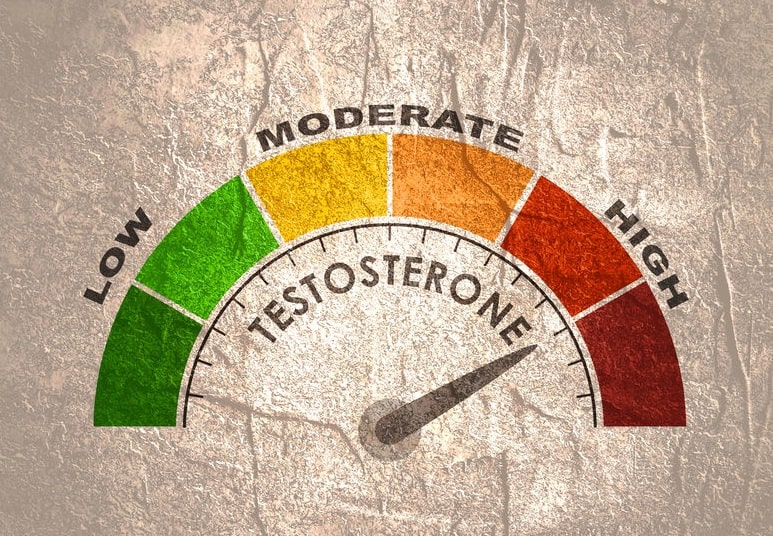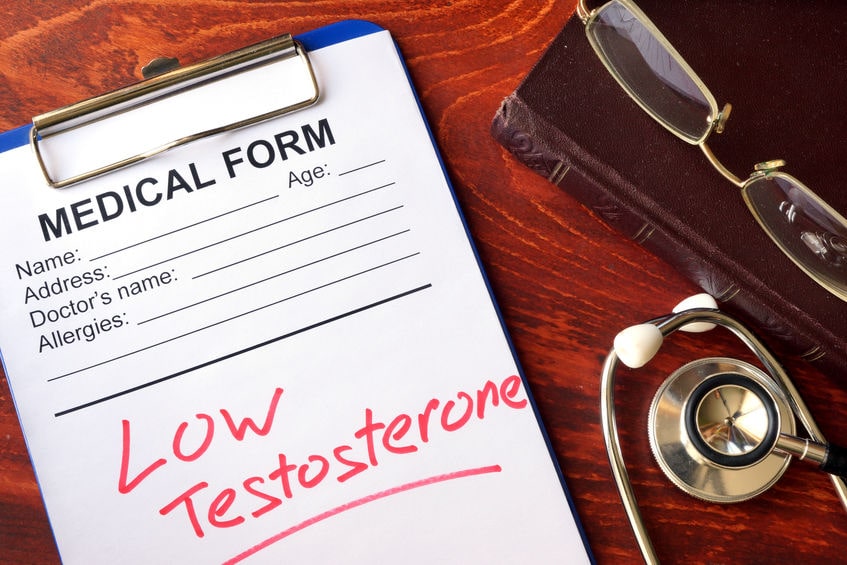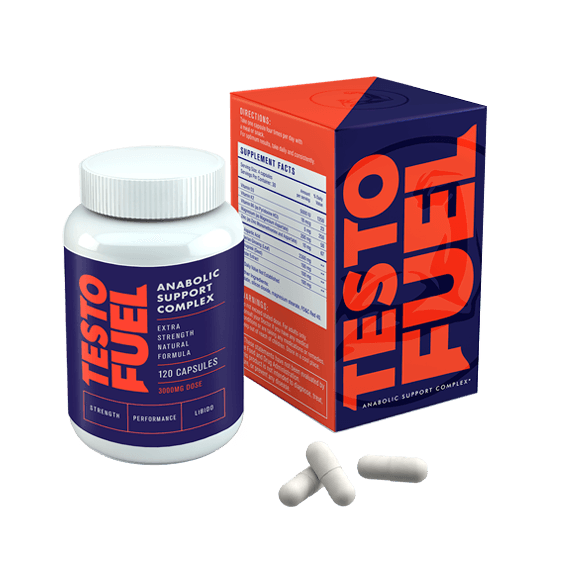
Testosterone levels change depending on sex, age, and health. Even your lifestyle has a say in how well your T is produced.
Are you wondering how your levels add-up compared to other men your age? Find out today.
What is testosterone?
Testosterone might be known as the male sex hormone, but it’s vital to everybody’s health.
Both biological sexes rely on the potent androgen for many important internal functions. From developing muscle mass and sex drive, through to energy and fertility, there’s not much that T leaves un-touched.
However, men produce much more testosterone than women. It’s undisputedly the most important hormone in a man’s body, managing everything from bone growth to mental wellbeing.
Functions of testosterone in men include:
- Muscle growth and maintenance
- Fat distribution
- Energy
- Bone density
- Mood
- Libido
- Sexual function
- Fertility
Maintaining healthy testosterone levels can help you live your best life. So much so, studies have shown that when T production drops, quality of life often declines too[1].
What are the typical testosterone levels in men?
Typical testosterone levels vary between 300-1000 ng/dL. However, healthiest levels seem to sit around 400-600 ng/dL., considering many men face a natural slump in production in middle age.
Most men think about testosterone as a hormone that only appears in adolescence. Yet, the truth is, T could have been active and influencing your body as early as seven weeks after conception.
Production takes a sharp upward trajectory once you reach your teenage years. Here it influences the masculine changes associated with puberty, before reaching peak production at around age 18 to 19[2]. There’s a high chance you’ve felt this phenomenon yourself.
Below are the typical testosterone levels of men by age:
| Age
(years) |
Total Testosterone Level (ng/dL.) |
| 15-16 | 100 – 1200 |
| 17 – 18 | 300 – 1200 |
| 19+ | 240 – 950 |
| < 25 | 376 – 1008 |
| 25 – 29 | 257 – 1081 |
| 30 – 34 | 233 – 1009 |
| 40 – 44 | 201 – 993 |
| 45 – 49 | 220 – 872 |
| 50 – 54 | 170 – 918 |
| 55 – 59 | 204 – 900 |
Low testosterone levels in men – signs and symptoms
Hypogonadism – aka low testosterone – can be a life changing condition for some men. It’s commonly referred to as the male menopause, as a drop in androgen levels and activity causes significant side-effects to the body.
Low testosterone occurs when total testosterone levels fall below 300 ng/dL. A doctor will likely ask you certain lifestyle questions and take a blood test to confirm your status.
Even if you experience some of the symptoms related to hypogonadism, you might just have lower than usual T levels, not an actual deficiency.
Adverse effects of androgen deficiency can range from uncomfortable, such as muscle loss and lower libido, to severe in the case of increased obesity and heart disease risks. Low testosterone can have a significant impact on your quality of life.
Symptoms of low testosterone include[3]:
- Muscle loss
- Reduced muscle tone
- Increased body fat
- Frailty
- Tiredness
- Low libido
- Sexual dysfunction
- Obesity
- Impaired cognitive function
- Depression
- Diabetes & prediabetic states
- Increased risk of cardiovascular disease
Age-related testosterone decline is a natural, inevitable process. It’s estimated that men lose around 20% of their T by age 60, 30% by age 70, and 50% past the age of 80[4].
Doctors don’t usually see age-related hypogonadism as a reason for medical intervention via TRT.
High testosterone levels in men – health benefits

Given the symptoms of low testosterone, you’d be forgiven for thinking more is better by default. However, healthy testosterone is all about finding the Goldilocks zone.
Too much can carry health and behavior complications of its own[5]; but, it’s extremely rare for men to have unhealthily high levels naturally.
Healthy thriving testosterone, on the other hand, promotes many health benefits. Having levels at the upper end of normal for your age can allow you to enjoy testosterone’s famed functions.
Health benefits of higher testosterone levels include:
- Easier development of muscle mass
- Faster exercise recovery
- Lower levels of body fat
- Increased energy
- Stronger bones
- Virility
- Healthy libido and sexual performance
- Fertility
- Cognitive function
- Better mood
With higher (healthy) testosterone you’ll typically find it easier to build muscle and burn body fat. Naturally, this should reduce your risk of developing obesity and additional metabolic disorders.
Greater amounts of muscle mass also contribute to a faster metabolism, as muscle is more metabolically demanding than body fat. As a result, greater amounts of muscle mass equate to a higher daily energy burn, which lowers your chances of overeating.
So, not only can healthy testosterone help you stay strong, but leaner too. Naturally, this might influence how confident you are, or how well you do in physical activities.
You should also experience well-balanced energy levels, a healthy libido, and consistent sexual performance thanks to higher testosterone.
Not only can this impact your mood, but overall wellbeing, both physically and mentally too. Like we touched on earlier, your testosterone status can have a direct impact on your quality of life.
Speaking about quality of life, both depression and anxiety are commonly seen in men with low testosterone. However, these symptoms are also common signs of aging, which makes confirming hypogonadism as their cause complicated.
Testosterone influences neurological processes in the brain. Therefore, healthy higher levels should allow them to operate properly, compared to the hindered neurological processes of hypogonadal men[6][7].
Diagnosing and testing low testosterone
If you or your doctor suspects you’re suffering from low testosterone, you’ll need to take a test. Although you may spot the symptoms yourself, only a blood test can confirm if your levels are truly low.
Your testosterone is typically higher in the morning; therefore, this is when you’re most likely to be tested. Depending on the doctor, you might also be asked to take one or more tests later in the day. This is because testosterone levels usually fluctuate.
Testosterone can be easily influenced by your habits. As a result, a doctor might also wish to know your medical history and lifestyle, both current and past.
Questions may include; have you ever used anabolic steroid or opiates, do you or have you smoked and how much alcohol do you drink. They may also ask you to perceive your level of stress.
Other steps carried out by a doctor may include:
- Checking blood pressure
- Measuring BMI
- Assessing for obesity
- Looking for pattern baldness
- Analyzing testicle and/or prostate gland size

How can you treat low testosterone?
Treating clinically low testosterone is typically a task for TRT – aka testosterone replacement therapy. This is a prescription form of lab-created, synthetic testosterone, used to replenish your lacking stores. It doesn’t increase natural production but replaces it either somewhat or entirely.
Methods of TRT include:
- Injections
- Implant
- Skin patch
- Oral patch
- Gel
Studies show that the use of TRT helps reverse symptoms of hypogonadism. The synthetic testosterone used activates androgen receptor sites by binding to them and restarting their respective functions. A list of the functions triggered by testosterone can be seen further above.
However, TRT isn’t without its risks, especially when abused. Potential side effects of testosterone replacement therapy include:
- Acne
- Oily skin
- Voice deepening
- Development of larger breasts
- Infertility
- Testicular atrophy
- Increased risk of blood clots
- Heightened risk of stroke
- Increased risk of heart attack
Natural methods to increase testosterone levels
You might not choose to take TRT though because the long-term health effects aren’t known.
On the other hand, you might find you aren’t able to acquire TRT legally, as your doctor doesn’t feel the need to prescribe it, or your medical insurance doesn’t cover the cost.
Fortunately, there are natural ways to try and increase testosterone levels. Hormones are incredibly sensitive to their environment and T is no different.
Living a health-promoting lifestyle works to create the best surroundings for testosterone to thrive.
Naturally, this all starts by solidifying the four pillars of optimal wellbeing; exercise, nutrition, sleep, and stress.

Exercise
Research shows that men who exercise regularly typically have higher testosterone levels than their sedentary peers[8].
Weight training seems to reign triumphant[9][10], followed by high-paced by HIIT[11][12], with moderate cardio being last.
Prolonged endurance exercise, on the other hand, appears to cause chronic cortisol increases, which contributes toward exercise induced testosterone inhibition[13].
For the best results, try to become a regular in the weight room, lifting three to five times per week[14], or potentially six for more advanced athletes.
Be wary not to enter the destructive realm of overtraining. Exercise works like a bell curve, meaning there’s a fine line between optimal volume and over working yourself.
Make sure to take a de-load week every five or sixth week, while constantly checking for the warning signs of overtraining, such as; early fatigue, sleeplessness, weakness, and of course, lower testosterone[15].
Nutrition
What you eat leaves a lasting mark on testosterone levels. As always, a healthy, well-balanced diet supplies the right nutrients for hormones to thrive.
Without them, production becomes compromised – with them, your body has keys to unlock its potential.
Testosterone relies heavily on you consuming healthy fats. Not many men know this, but testosterone is synthesized from cholesterol, therefore a low-fat diet spells bad news for T production[16][17].
Eating a wide variety of healthy fats such as avocado, organ meat, and eggs on the other hand, can be beneficial for bolstering levels.
Vitamin D, Zinc, and Magnesium are three other essential nutrients, but on a more micro level. These micronutrients are all shown to impact testosterone status, with deficiency in any leading to plummeted T production[18][19][20].
Eating enough of them or using a testosterone boosting supplement should stop the risk of reduced testosterone levels.
Sleep
Your sleep is king in the realm of health. Testosterone especially is incredibly sensitive to sleep, with deprivation causing significant androgen loss overnight[21].
This is because a majority of testosterone release occurs during slumber.
Studies show that sleeping as little as five hours in one evening aged young, otherwise healthy male’s testosterone levels by what you’d usually expect after 10-15 years[22].
Alarmingly, experts predict that a high proportion of American men fall into a sleep deprived category.
To protect your testosterone, aim for a minimum of seven to eight hours of high-quality sleep every single night.
Establishing a routine can be an effective strategy to set your body clock and make achieving a deep sleep easier.
Stress
When your body senses stress it releases the hormone cortisol. Now, this hormone release can be beneficial in the short-term when facing real, potentially fatal events.
However, chronic cortisol release causes consistently high levels, which has a negative correlation with testosterone.
Studies show that when cortisol increases, testosterone decreases[23]. As a result, prolonged exposure to stress, something prevalent in modern society, has a significant knock-on effect for your hormone balance. Sexual performance and sleep can also suffer too.
We appreciate not every ounce of stress in your life can be taken away. However, we encourage you to take time to relax, unwind, and consider how much stress you can cut ties with.
Agree to less unimportant obligations and find a way to release tension, such as getting out in nature, taking up a new hobby, and exercising. Stress is the silent killer of testosterone – don’t let it take over yours.
Takeaway
Most men can go through life without any abnormalities to their testosterone. Healthy levels enhance your verity, keeping you your strongest, fittest, and happiest self.
Testosterone is hailed as the most important hormone in your body for a good reason – it’s essential to your wellbeing.
Low testosterone – aka hypogonadism – can happen to any man, at any time.
Age-related testosterone decline typically starts around age 30; however, disease and lifestyle can exasperate the issue.
A doctor should perform tests to confirm if you’re suffering from hypogonadism.
TRT isn’t the only treatment though, despite what many think. There are natural ways to help promote T production, which all begins with leading a healthy lifestyle.
Take control of your testosterone today by following the four basic steps.
References
[1] https://www.ncbi.nlm.nih.gov/pubmed/17178553
[2] https://www.ncbi.nlm.nih.gov/pmc/articles/PMC4190174/
[3] https://www.ncbi.nlm.nih.gov/pmc/articles/PMC4391003/
[4] https://www.ncbi.nlm.nih.gov/pmc/articles/PMC4190174/
[5] https://www.health.harvard.edu/drugs-and-medications/testosterone–what-it-does-and-doesnt-do
[6] https://www.ncbi.nlm.nih.gov/pubmed/8678193/
[7] https://www.ncbi.nlm.nih.gov/pubmed/18562400/
[8] https://www.ncbi.nlm.nih.gov/pubmed/22234399
[9] https://www.ncbi.nlm.nih.gov/pubmed/17051372
[10] https://www.ncbi.nlm.nih.gov/pubmed/2796409
[11] https://www.ncbi.nlm.nih.gov/pubmed/23310924
[12] https://europepmc.org/abstract/med/25373470
[13] https://www.ncbi.nlm.nih.gov/pmc/articles/PMC5988228/
[14] https://www.ncbi.nlm.nih.gov/pubmed/17051372
[15] https://www.ncbi.nlm.nih.gov/pmc/articles/PMC3435910/
[16] https://www.ncbi.nlm.nih.gov/pmc/articles/PMC6266690/
[17] https://academic.oup.com/jcem/article/90/6/3550/2870596
[18] https://academic.oup.com/jcem/article/102/11/4292/4096785
[19] https://www.ncbi.nlm.nih.gov/pubmed/8875519
[20] https://www.ncbi.nlm.nih.gov/pmc/articles/PMC3958794/
[21] https://www.ncbi.nlm.nih.gov/pubmed/18519168/
[22] https://www.ncbi.nlm.nih.gov/pmc/articles/PMC4445839/
[23] https://www.ncbi.nlm.nih.gov/pmc/articles/PMC3880087/




Leave a comment
Selfish to not help people become aware of the effects of testosterone levels. Many countries would benefit from knowledge of hormone balances of the body.